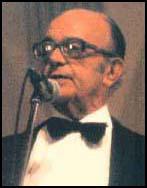Larry Adler

Larry Adler was born in Baltimore on 10th February, 1914. A self-taught musician, he won the Maryland Harmonica Championship at the age of 13 and began his show business career the following year.
He appeared in Sky High (1931), Many Happy Returns (1934), The Big Broadcast (1936), The Singing Marine (1937) and Sidewalks of London (1938). He also toured the USA, Europe, Africa and the Middle East. In 1938 he married Eileen Walser and the couple had three children. In the 1940s Adler played as a soloist with some of the world's leading symphony orchestras.
Adler was particularly liked for his renditions of George Gershwin. His friend, John Calder, has pointed out: "Adler... moved in jazz, modern music and Broadway musical circles, and he was adapting a wide variety of musical scores for his own instrument, as well as composing for it himself. He performed as a soloist with an orchestra in Sydney in 1939 as part of an Australian tour, and thereafter toured the world, either as an individual performer, his playing being interspersed with jokes, chats and anecdotes, or as part of a larger show."
After the Second World War the House of Un-American Activities Committee (HUAC) began to investigate people with left-wing views in the entertainment industry. In June, 1950, three former FBI agents and a right-wing television producer, Vincent Harnett, published Red Channels, a pamphlet listing the names of 151 writers, directors and performers who they claimed had been members of subversive organizations before the war but had not so far been blacklisted. The names had been compiled from FBI files and a detailed analysis of The Daily Worker, a newspaper published by the American Communist Party.
A free copy of Red Channels was sent to those involved in employing people in the entertainment industry. All those people named in the pamphlet were blacklisted until they appeared in front of the House of Un-American Activities Committee and convinced its members they had completely renounced their radical past. Adler was one of those named and after refusing to appear before the HUAC. Adler said, "The only way to get off that blacklist was to go before the committee and shop your friends. There was no way I was going to do that."
Adler moved to England where he wrote the music for films such as Genevieve (1953), The Hook (1963), King and Country (1964) and A High Wind in Jamaica (1965). Humphrey Lyttleton commented: "He made wonderful music, you just can't get away from it, the sound he got out of the harmonica was as great as Yehudi Menuhin could get from a violin. He could express himself equally well in pop, jazz or classical music."
In 1969 Adler married Sally Cline. The couple had one daughter but the marriage was dissolved in 1977. In his later years Adler also worked as a journalist and was food critic for Harper's & Queen. Books by Adler included It Ain't Necessarily So (1985) and Me and My Big Mouth (1994).
John Calder has commented: "It has often been asked why he did not bring his musicianship to a more conventional instrument, but he was not interested in being just a musician. He enjoyed entertaining an audience and his sense of timing when relating a story on stage made him a stand-up comic and raconteur of considerable charisma. During the last 30 years he had spent much time in night-clubs and small theatres and with a one-man show that employed all his talents."
Larry Adler died in London on 6th August 2001.
